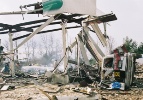
Third Ghent Firefighter Dies from Explosion Injuries
USFA announced Lt. Donnie Caldwell, 74, of the Ghent Area Volunteer Fire Department died May 13 as the result of complications from injuries he sustained in the Jan. 30, 2007, propane explosion at the Little General Store.
Lt. Donnie Caldwell, 74, of the Ghent Area Volunteer Fire Department has died as the result of complications from injuries he sustained in the Jan. 30, 2007, propane explosion at the Little General Store in Ghent, W.Va., the U.S. Fire Administration announced Monday. Caldwell had 20 years' service and died May 13. His funeral is scheduled for May 17 (arrangements by Blue Ridge Funeral Home Chapel), and a memorial fund has been established in his honor, c/o Ghent Area Volunteer Fire Department, PO Box 99, Ghent, WV 25843.
According to the U.S. Chemical Safety Board's report on the blast, it happened because liquid propane was spilled while being transferred from an existing, 500-gallon tank to a new tank. The existing tank was located next to the store's exterior back wall in violation of West Virginia and OSHA regulations, CSB found. The technician making the transfer called his supervisor for guidance, and during the call, a vapor cloud formed behind the store and entered the building. Volunteer firefighters arrived and ordered the store to close, which it did, but store employees remained inside. Two firefighters and a lead technician who had arrived were standing near the tank when the propane inside the store exploded, killing the two firefighters -- Capt. Fred Burroughs and Firefighter-EMT Craig Dorsey -- and both propane service technicians. Four store employees and two firefighters were injured.
CSB's board approved the final report at a public meeting in Beckley, W.Va., on Sept. 25, 2008. The report said the propane supply company's inspection and audit program hadn't identified the older tank as a hazard, and the junior service technician had not received formal training and was working alone that day. CSB also said emergency responders should have been trained that immediate evacuation is necessary during propane releases. None of the department's responders had received specific propane emergency training, CSB's report said.
"A propane emergency significant enough for fire department response is reported nearly everyday in the United States. Only gasoline and natural gas are involved in more hazardous materials emergencies," the report noted.
Twenty-eight firefighter fatalities have been reported thus far in 2010, according to USFA. Its firefighter fatality reports are posted at www.usfa.dhs.gov/fireservice/fatalities/statistics/ff_stats.shtm.